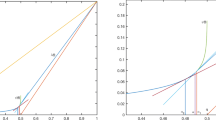Summary
A uniform framework for the study of upwinding schemes is developed. The standard finite element Galerkin discretization is chosen as the reference discretization, and differences between other discretization schemes and the reference are written as artificial diffusion terms. These artificial diffusion terms are spanned by a four dimensional space of element diffusion matrices. Three basis matrices are symmetric, rank one diffusion operators associated with the edges of the triangle; the fourth basis matrix is skew symmetric and is associated with a rotation by ϕ/2. While finite volume discretizations may be written as upwinded Galerkin methods, the converse does not appear to be true. Our approach is used to examine several upwinding schemes, including the streamline diffusion method, the box method, the Scharfetter-Gummel discretization, and a divergence-free scheme.
Similar content being viewed by others
References
Bank, R.E., Rose, D.J.: Some error estimates for the box method. SIAM J. Numer. Anal.24, 777–787 (1987)
Bank, R.E., Rose, D.J., Fichtner, W.: Numerical methods for semiconductor device simulations. IEEE Trans. Electr. Dev., ED-30, 1031–1041 (1983)
Bürgler, J.F., Bank, R.E., Fichtner, W., Smith, R.K.: A new discretization for the semiconductor continuity equations. IEEE Trans. Computer-Aided Design of Integrated Circuits and Systems8, 479–489 (1989)
Caussignac, P., Touzani, R.: Linear conforming and nonconforming upwind finite elements for the convection-diffusion equation. IMA J. Numer. Anal.8, 85–103 (1988)
Hughes, T.J.R., Brooks, A.: Streamline-upwind Petrov-Galerkin formulations for convective dominated flows with particular emphasis on the incompressible Navier-Stokes equations. Comput. Methods Appl. Mech. Eng.32, 199–259 (1982)
Hughes, T.J.R., Brooks, A.: A theoretical framework for Petrov-Galerkin methods with discontinuous weighting functions: Application to the streamline upwind procedure. In: Gallagher, R.H., Norrie, D.H., Oden, J.T., Zienkiewicz, O.C. (eds.) Finite elements in fluids, Vol. 4, pp 47–66 New York: Wiley 1984
Ikeda, T.: Maximum principle in finite element models for convection-diffusion phenomena. North-Holland Mathematics Studies, Vol. 76, (Lecture Notes in Numerical and Applied Analysis, Vol. 4). Amsterdam: North-Holland 1983
Johnson, C., Navert, U., Pitkaranta, J.: Finite element methods for linear hyperbolic problems. Comput. Methods Appl. Mech. Eng.45, 285–312 (1984)
Ohmori, K., Ushijima, T.: A technique of upstream type applied to a linear conforming finite element approximation of convection-diffusion equations. RAIRO Anal. Numer.18, 309–332 (1984)
Strang, G., Fix, G.: An Analysis of the finite element method. Prentice-Hall, Englewood Cliffs, New Jersey 1973
Author information
Authors and Affiliations
Additional information
The work of this author was supported by the Office of Naval Research under contract N00014-89J-1440
The work of this author was supported through KWF-Landis/Gyr Grant 1496, AT & T Bell Laboratories, and Cray Research
Rights and permissions
About this article
Cite this article
Bank, R.E., Bürgler, J.F., Fichtner, W. et al. Some upwinding techniques for finite element approximations of convection-diffusion equations. Numer. Math. 58, 185–202 (1990). https://doi.org/10.1007/BF01385618
Received:
Issue Date:
DOI: https://doi.org/10.1007/BF01385618




